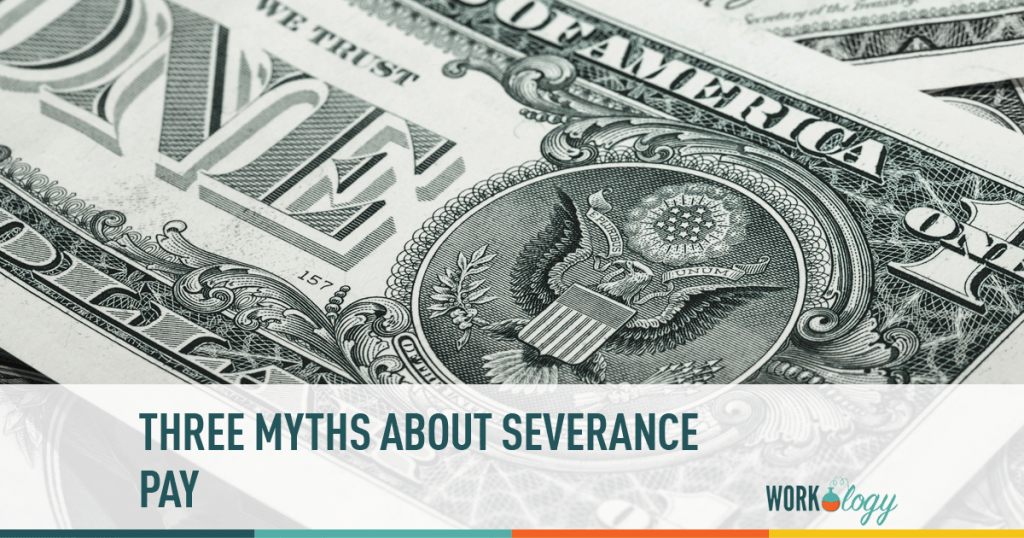Defining Severance Pay and Employee Terminations
I get occasional calls from clients asking me about severance pay. What is required? What is customary? Is this different than a severance package? Should there be a release or not? Of course the simple answers are nothing, nothing and maybe. Straight forward enough for you? Ok, I will provide a little more detail by clearing up some myths about severance pay for HR, company leaders, and any organizational manager.
Myth #1 Companies must provide severance pay or package to employees they terminate.
Many of you know the answer to this question is “no” but many employees don’t know that. There is nothing in the Fair Labor Standards Act that requires severance pay. States for the most part don’t require severance pay either, even California. Maine requires severance if you relocate or close a facility. This is somewhat akin to provisions of the WARN Act, but it covers more employers than might be covered by WARN.
There are a couple of exceptions to this rule however. First, if there is a contract that specifically provides for severance, then naturally you have to abide by the contract. Secondly, if there is a company policy that provides for severance then typically you must abide by your own policy. (Naturally circumstances may necessitate you altering this policy so I hope you have your basis covered there by stating that management has that right.)Thirdly, if you have set a precedent that is well established and well known then not following that precedent may cause you some difficulty.
Myth #2 The common practice is one week for every year of service.
There is no real common amount. There are a number of factors that go into determining what is paid, if anything. You have to look at how many people are involved; what are the levels of positions; what are the economic conditions and what can you afford; what has been done before; and what are the circumstances of the termination(s). In group situations you want to do some “costing” to determine what various options are going to cost you before you make a decision. I have been in a situation where in one cut back 20 people were let go. One of them was my secretary. She and I had started the same day and we had been with the company 1.5 years. She and the other 19 were given 4 months of severance. Two months later 200 people were cut, of which I was one. I got 4 weeks of severance. I have seen situations where people get a year or more of severance, but I have also seen situations where no severance was given at all. So there is no “common” in severance.
Myth #3 Everyone getting a severance needs to sign a release.
The answer to that is “not necessarily.” A release, or waiver, may often protect a company by ensuring through a contractual agreement that an employee will not sue the company. However, such a waiver may not be necessary and may actually raise issues where no issues existed. As attorney Richard Meneghello, of Fisher & Philips says “Many times, if the employment relationship is rocky, and the employee is fearful, and possibly litigious, offering them a severance agreement could be a bad step. The employee might start to think that “where there’s smoke, there’s fire,” and begin believing a conspiracy theory exists where you must be trying to hide something by buying them off. Sometimes we recommend that you simply terminate the employee and cross your fingers, for fear that handing them a severance agreement will plant ideas in their head that you must be covering up something.” So you need to decide whether the employee or employees you are terminating pose a risk.
Other Factors Like the Older Worker Benefits Protection Act
Another factor that goes into severance determination is the age of the worker. The Older Worker Benefits Protection Act has severance requirements that must be adhered to if severance is being offered. But that is a post for another day. Until then I hope I debunked some myths about corporate severance packages and the requirements for the employer to the employee.









3 Comments
Appreciate this article. Here’s one I’ve never heard a conclusive answer to. True or false: Your former employer cannot require you to wait until after your severance runs out before you file for unemployment benefits. I’ve always done so right away, even when the company tried to define severance payments as “wages” (I was told by an employment lawyer that they can call it whatever they want; if you don’t work there anymore, by definition it’s not a wage). However, I’ve also heard that it can vary across different states.
One thing I think it’s safe to say is that, as long as you don’t lie on your application, you really have nothing to lose by applying right away. The worst that can happen is that your claim can be denied, and you’ll have to wait to re-file it.
Greg:
Unemployment insurance is indeed a state run program and the rules will vary. Generally if you receive a severance it may be deemed “Wages in lieu of notice” and that will delay you receiving unemployment. But as far as I know your employer cannot bar you from applying. They will respond to the claim and then a determination will be made. You may be denied, you then just go reapply.
Michael,
Thanks. You’re right that I should have distinguished between severance and wages in lieu of notice. The latter are generally limited to two weeks, and are paid out regardless of whether you sign a severance agreement. Severance pay is an additional payment on top of that, usually based on the employee’s tenure with the company. It is also usually paid in a lump sum, but sometimes companies will pay it out over the same intervals as pay checks, and even try to define those payments as wages. My point was that you should check applicable state laws, and possibly even consult with an employment lawyer, but generally speaking, the fact that they define it as wages in a severance agreement does not make it wages, and therefore does not prevent you from claiming unemployment benefits after two weeks.
At least, that’s my understanding. If you or anyone has a different perspective, I’d love to hear it. I went through this once, and the information out there is as clear as mud.
Comments are closed.